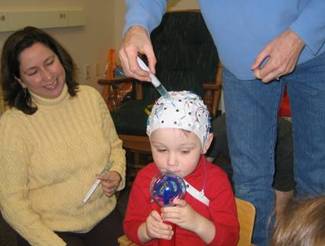Research Areas
Autism
Autism is an atypical type of neurodevelopment. The symptoms of which typically appear during the first three years of life. It occurs in approximately 168 out of every 10,000 births and is approximately three to four times more prevalent in males than females. Autism can affect the processing, integrating, and organizing of information and significantly impacts communication, social interaction, and functional skills.
Learn more about our research projects in this area.

Down Syndrome

Down Syndrome is the most common genetic cause of intellectual disability, with an incidence of 1 in 800 births. It is caused by an extra copy of chromosome 21 which leads to deficits in a number of cognitive areas including math and language.
Learn more about our research projects in this area.
Fragile X Spectrum
Fragile X Syndrome is the most common cause of inherited intellectual disability. It is a genetic disorder resulting from an expanding trinucleotide (CGG) repeat on the X chromosome. When the number of repeats is 200 or more, the fragile X gene is silenced, leading to a lack of FMRP (fragile X messenger ribonucleoprotein 1). This protein is thought to be important in the early development of the brain, but researchers are still studying exactly when, how and where it works during development. Males with fragile X usually have intellectual disability and often exhibit characteristic physical features and behavior. Affected females exhibit a similar, but usually more subtle symptom profile. The cognitive profile of fragile X includes deficits in visuospatial processing and working memory, visual-motor coordination, and poor arithmetic skills.
Learn more about our research projects in this area.

Typical Development

Our research in typical development encompasses the areas of concept formation and quantitative reasoning. We study these topics in infants as well as children from about 4 to 15 years of age.
Learn more about our research projects in this area
